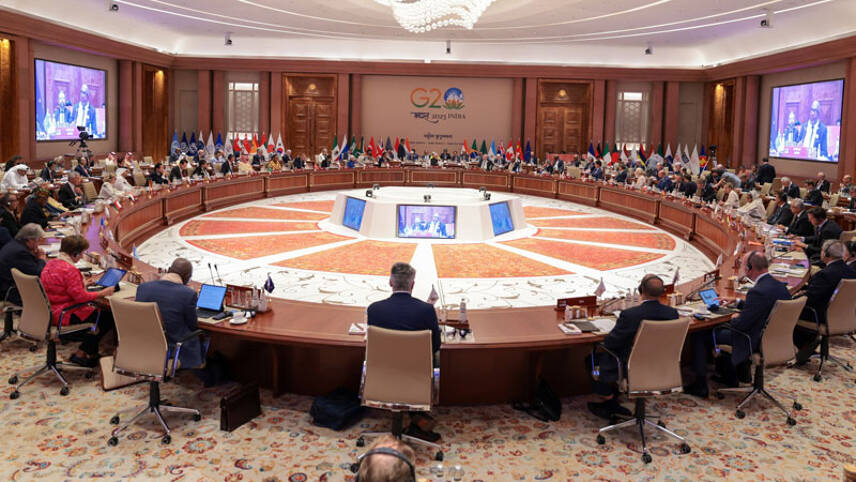Register for free and continue reading
Join our growing army of changemakers and get unlimited access to our premium content

It had been hoped that the Summit, hosted in New Delhi during the weekend, would set out strong terms for global consensus on decarbonisation, sustainable development and protecting and restoring nature ahead of the UN’s climate summit in Dubai this winter.
This was particularly crucial after a frought process at the G20 meeting for Energy Ministers earlier this year. At that meeting in July, several nations were reluctant to agree to a more rapid energy transition, citing increased profitability of fossil fuels in the energy price crisis and a heightened focus on energy security. No final communique was produced.
This weekend’s summit did see nations finally agreeing to “pursue and encourage efforts to triple renewable energy capacity globally” by 2030. This is a vision that has been recommended by the International Energy Agency (IEA).
Mobilising at least $4trn per year by 2030 will be necessary to meet this goal, the final agreement states. It emphasizes the importance of increasing the share of this investment which goes to developing and emerging economies. For example, Africa only attracts 2-3% of global clean energy investment each year.
Climate think-tank Ember said scaling renewables so rapidly “is the biggest single action that would keep 1.5C within reach”.
350.org similarly called the agreement “a historic step” and “a glimmer of hope in our battle against climate chaos”.
Also welcomed was the emphasis on a just energy transition, coupling decarbonisation with efforts to improve socio-economic equality.
The text states: “The macroeconomic costs of the physical impacts of climate change are significant both at aggregate and country levels, and the cost of inaction substantially outweighs that of orderly and just transitions.
“Just energy transitions can improve jobs and livelihoods, and strengthen economic resilience. We affirm that no country should have to choose between fighting poverty and fighting for our planet. We will pursue development models that implement sustainable, inclusive and just transitions globally, while leaving no one behind.”
There are not, however, any detailed plans with set dates for delivering a just transition. This had been advocated by businesses participating in The Climate Group.
Fossil fuel sticking points
While the renewables goal has been widely celebrated, green groups have expressed concern at a lack of strong agreements on other facets of the energy transition.
Regarding the IEA’s recommendation to double the rate of energy efficiency improvements by 2030, the document only states that G20 nations will “take note”.
The language on fossil fuels is also weak in places. The text states that “unabated” coal power should be “phased down… in line with national circumstances and recognising the need for support towards just transitions”.
Oil and gas are not mentioned directly.
Additionally, the section on renewables states that “similar ambition” will need to be shown in scaling up carbon removal technologies. Saudi Arabia and China are understood to have led the push for this part of the text, just as they and other fossil fuel exporters advocated carbon capture as an alternative to renewables at COP27.
UN Secretary-General Antonio Guterres has spoken strongly against this kind of rhetoric. He stated previously: “The problem is not simply fossil fuel emissions – it is fossil fuels, period. Countries must progressively phase them out and massively boost renewable investments.”
The G20 meeting was held shortly after the UN released its first global stocktake of climate commitments from governments, which confirmed that the Paris Agreement’s 1.5C pathway can only be delivered with “radical decarbonisation” beyond what has already been agreed.
Former Unilever boss and IMAGINE co-founder Paul Polman said the G20’s “failure to commit, explicitly to phasing out fossil fuels is an unforgivable abdication of leadership”. He said continuing to subsidise the sector is “expensive suicide”.
A note on nature
No new agreements were reached on nature at this weekend’s meeting. Nations reiterated their existing commitments under the UN Biodiversity Treaty including the need to improve nature-related data collection and reporting.
CDP warned earlier this month that G20 nations are not preparing to mandate corporate nature-related disclosures, as they are required to do under the UN’s treaty. The body revealed “limited to no policies” in most G20 member markets.


This comment has been removed by the commenter.
It seems doubtful to me, as a retired scientist, that these activities, sumptuous surroundings, are well informed on the science of the subject; perhaps I am wrong.
Renewables are all nature related, and variable beyond our control; they are “grab it when you can get it” sources.
The only carbon-free sources we have, totally in our control, are fission, and when we get it, fusion.
But I do not believe that the members of the depicted assembly, really understand this pivotal reality.
I hope that I am wrong, but……